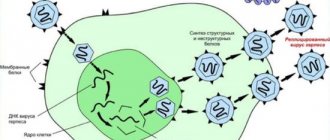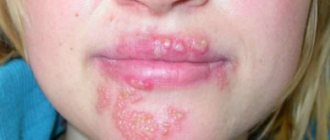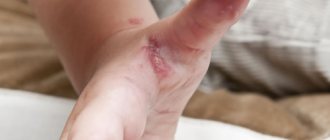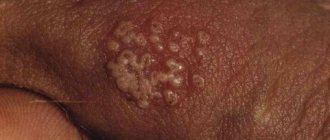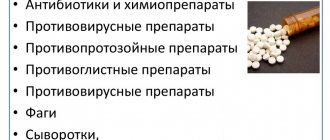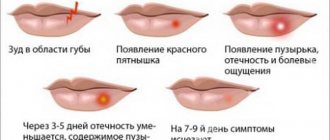Causes
Infection with the virus occurs in several ways: through sexual contact and exchange of fluids, and in more rare cases, through household objects.
The source of infection is a person who has an acute phase of herpes. The herpes virus enters the body through microcracks in the skin and mucous membranes, as well as through droplets. Once in a human body with a strong immune system, the virus does not manifest itself and remains in a latent state until activating factors appear. These include:
- hypothermia;
- stress;
- depression;
- chronic diseases;
- avitaminosis;
- decreased immunity;
- colds and ARVI;
- oncological diseases.
Diagnosis of genital herpes
PCR - polymerase chain reaction - detection of DNA or traces of DNA in blood or smears from vesicles of the urethra, cervical canal, rectal ampulla.
Serological studies:
- ELISA – enzyme-linked immunosorbent assay;
- DIF – direct immunofluorescence analysis;
- NIPI—indirect immunoperoxidase assay;
The purpose of these studies is to detect antibodies, indicating the strength of the immune response.
Ig M antibodies indicate primary infection, and Ig G antibodies indicate relapse
Cultural method - inoculation of material (smears, urine, sperm, contents of herpetic vesicles) on a chicken embryo, nutrient broth or agar-agar.
Course of the disease
The herpes virus can be transmitted through a kiss.
When an infected person comes into contact with a healthy person, the virus enters the body through microcracks in the skin or mucous membranes. Along with the bloodstream, microorganisms invade nerve cells. Once on the skin, the virus immediately begins to implant its DNA into the nuclei of skin cells, provoking characteristic symptoms. A virus that has invaded nerve cells does not manifest itself in any way.
Primary form
Primary herpes appears immediately after infection of a healthy body. All clinical symptoms in the first stages of infection are considered an infection event. Affected areas may have a large number of lesions or be localized to small areas of the skin. In rare cases, the carrier of the infection does not develop any symptoms after the initial infection with anal herpes.
Hidden form of anal herpes
Hidden carriage of the anal herpes virus is characterized by the absence of clinical symptoms. At the same time, the herpes virus does not appear in clinical samples, although it persists on the genitals and poses a danger to healthy people. The hidden form of anal herpes is rare.
Relapse of the disease
The virus is activated against the background of weak immunity.
After the first symptoms of anal herpes disappear, the virus remains in the body, waiting for the right moment to appear again. When the immune system is weakened under the influence of certain factors, anal herpes relapses. If exacerbation of the disease occurs 6 times a year or more, herpes becomes recurrent.
Symptoms of anal herpes
They are quite varied and can be excruciating in terms of pain.
Once the virus enters the body, it is impossible to get rid of it. Scientists have not yet found an effective remedy against anal herpes.
The symptoms of rectal herpes are similar to the symptoms of genital herpes, as well as the signs of the herpes simplex virus - the causative agent is the same:
- possible increase in temperature;
- itching and redness of the anus;
- rashes in the form of bubbles filled with liquid;
- pain;
- bloody discharge due to internal herpes of the rectum
Signs and symptoms
After the herpes virus is introduced into the body, the immune system is activated and suppresses negative manifestations. But as soon as the immune system weakens, herpes near the anus will appear again.
Symptoms appear immediately in a certain order. Herpes manifestations are the same in both sexes and do not depend on age, so diagnosing the disease is not difficult for a specialist. As a rule, rashes around the anus have a characteristic progressive course. The incubation period of the disease takes from 2 to 28 days, depending on the characteristics of the organism.
Incubation period
There is a burning sensation near the anus, sometimes tingling and pain, itching. This condition is provoked by viral microorganisms that have already penetrated into the cell nuclei. The DNA of the herpes virus, which has penetrated the skin cells, starts the process of producing viral microorganisms. The process provokes a negative response from the body, manifested by external rashes.
Rash formation
The addition of a bacterial infection provokes suppuration.
After cells are damaged by the herpes virus, redness first appears on the surface of the skin. After some time, small bubbles appear on the reddened areas, inside of which there is a cloudy liquid. The blisters can coalesce, forming large lesions on the skin and causing discomfort and pain. This indicates the proliferation of viral microorganisms that are located in the bubbles.
Recovery
At this stage, the bubbles begin to burst spontaneously. The patient becomes especially contagious, since viral microorganisms are in the liquid. At the sites of the vesicles, ulcers and wounds remain, which after a short period are covered with a hard crust - a scab. After 1-2 days, the crust falls off, leaving pink spots in its place. The skin gradually regenerates and is completely restored.
Treatment methods
It will not be possible to cure herpes near the anus forever, but modern medicine can completely stop the manifestations of the disease.
Drug therapy
For therapy, both internal and local preparations are used - creams and ointments. The patient is prescribed a course of immunomodulators and vitamins to strengthen the immune system. The most commonly prescribed drugs are:
- Zovirax;
- Farmavir;
- Arbidol;
- Acyclovir.
If an infection is associated with herpes erosion, the patient is prescribed a course of antibiotics. Everything is prescribed by the doctor, only he will be able to correctly calculate the dosage and regimen of drugs for each patient, taking into account the severity of the disease and the individual characteristics of the patient.
To strengthen the immune system, taking medications is not enough. It is important to follow a few rules;
- You should follow a diet that excludes fatty, fried and spicy foods. It should consist of fresh vegetables and fruits, as well as dairy products. It makes sense to give up sweets, that is, sugar, chocolate and carbonated drinks.
- It is very important to get rid of bad habits.
- Stress and situations that undermine the nervous system should be avoided.
- It is necessary to exercise regularly and be outdoors more often.
Traditional medicine
There are a number of measures that can alleviate the course of the disease. But before using traditional medicine, you should consult your doctor. The patient may be allergic to one or another substance from medicinal plants. For greater effectiveness, traditional medicine is best taken together with conservative treatment:
- To strengthen your immune system, you can drink juice from beet tops, carrots and apples. You can add a little parsley to this mixture. You can drink this juice without restrictions throughout the day.
- You can also drink a mixture of the following herbs: nettle, sesame, rose hips, hawthorn, St. John's wort. You can drink 100 g of this decoction half an hour before meals. This will also strengthen the immune system.
- Herpes manifestations around the anus can be lubricated with celandine juice, 3 times a day for 10 days. This will relieve itching and speed up the healing of wounds.
- To large conglomerations of pimples, you can use a patch to stick an aloe leaf, cut lengthwise, with the freshly cut side, at night.
Diagnostics
The effectiveness of therapy depends entirely on timely consultation with a doctor and making the correct diagnosis. Diagnosing herpes in the anus is quite simple; this usually happens after an initial examination. As a rule, patients are sent for consultation at the acute stage of the disease, which delays treatment. Before prescribing therapy, the dermatologist carries out the following diagnostic measures:
- Initial external examination of the affected areas. At this stage, a preliminary diagnosis is made.
- Microscopic examination of a smear from damaged areas. The presence of viral organisms is determined.
- Serological examination of a smear to determine the type of virus and the presence of other pathogenic microorganisms.
- If necessary, an endoscopic examination is performed to check for rectal lesions.
Diagnosis of the disease
Herpes near the anus has specific manifestations, and an experienced doctor only needs an external examination and a competent history to diagnose the disease. If the specialist has doubts, the patient is subjected to a series of procedures to confirm the primary diagnosis. These include the following:
- blood test for enzymes;
- microscopy of scrapings of rashes;
- biopsy of acne samples;
- serology.
The sooner the disease can be diagnosed, the sooner treatment can begin.
Treatment of pathology
Local drugs as monotherapy are effective in the initial stages of the disease.
Self-treatment of anal herpes can lead to complications, so it is better to trust an experienced doctor in such a situation. After making a diagnosis, the doctor will select the most appropriate therapeutic course. As a rule, it includes the use of local drugs and bactericidal agents, as well as vitamin therapy. To reduce the risk of relapse of anal herpes, a course is prescribed to strengthen the immune system.
Medicines
To eliminate the pathological process on the skin, antiviral drugs are used for topical use. The most widely used ointments are:
- "Arbidol";
- "Gerpevir";
- "Acyclovir";
- "Zovirax";
- "Famvir."
To relieve burning and itching, antihistamines and medications with anti-inflammatory effects are prescribed. If secondary infection occurs through ulcers, antibiotics may be used. To dry the affected areas, bactericidal agents “Fukortsin” and brilliant green are used. To reduce severe inflammation, you can use Panthenol ointment, which has an antipyretic effect.
Strengthening the immune system
A strong immune system prevents the virus from multiplying.
To strengthen the immune system, you can use immunomodulators. These remedies include many medications, starting with ordinary herbal tinctures and adding expensive interferon drugs. In advanced cases, the doctor will select a suitable course of vitamin therapy. But there is an easier way to strengthen and maintain immunity - a healthy lifestyle and proper nutrition. Exercising, nutritious food rich in vitamins, and prolonged exposure to air have a beneficial effect on the body.
Folk remedies
It is advisable to treat manifestations of anal herpes at home under the supervision of a doctor. To eliminate rashes, use garlic juice or almond oil. Use a swab dipped in juice or oil to wipe the affected areas of the skin every 2 hours. A decoction of willow bark relieves inflammation if you make baths from it. Fresh plantain leaves reduce heat in areas of rashes.
Diagnosis and treatment
https://www.youtube.com/watch?v=videoseries
To confirm the diagnosis, an experienced doctor needs only characteristic clinical manifestations. In doubtful situations, molecular biological methods are used to detect HSV in scrapings from affected areas.
ELISA methods can also be used to detect specific antiherpetic antibodies in a patient's blood serum.
Differentiation is carried out with syphilis, Crohn's disease, some sexually transmitted infections, dermatoses, etc. If the relapse rate is more than 6 per year, examination is necessary to exclude HIV infection.
Treatment of anal herpes has the following goals:
- impact on the main symptoms;
- reduction in the number of exacerbations;
- improving the quality of life of infected people;
- prevention of complications;
- reducing the risk of infection to sexual partners or children.
The general strategic direction is the oral use of highly specific antiviral drugs - these are acyclic nucleosides that block the reproduction of HSV (Acyclovir, Famciclovir, Valaciclovir).
Tablet dosage regimens and course duration are determined by the doctor individually for each patient.
The effectiveness of therapy is quite high if treatment is started during the warning signs or when the very first rash appears.
Medicines can shorten the duration of the episode and reduce the severity of the clinic, but they do not destroy viruses and cannot affect the frequency and severity of subsequent possible relapses.
Local treatment of anal herpes is carried out in parallel with ointments and creams based on acyclovir to enhance the effect of the tablets. They are applied to clean and dry skin in the affected area.
In case of a chronic course of the disease and frequent relapses, the use of vitamin-mineral complexes is recommended; adult patients are prescribed a 5-day course of Interferon gamma 500 thousand IU subcutaneously every other day. Immunomodulatory therapy can only be recommended by a specialist; self-medication with such drugs is dangerous.
from the expert:
Prevention and prognosis
Herpes on the anus is considered a serious problem, accompanied by many unpleasant symptoms. Positive treatment is only possible with timely consultation with a specialist.
It is impossible to completely rid the body of the virus, therefore, after eliminating external signs, one should strictly adhere to prevention methods. Since the herpes virus is characterized by frequent relapses, preventive measures are aimed primarily at preventing recurrences. To prevent anal herpes, you should constantly strengthen and support the immune system. To do this, you need to eat right, lead an active lifestyle and, if possible, avoid stressful situations. It is recommended to stop drinking alcohol and smoking. Sexual activity should also be “healthy.”
Clinical manifestations of pathology
Features of symptoms depend on the type of disease.
The following forms of pathology are possible:
- Primary infection. The anus is affected. In the initial stage of infection, carriage without symptoms is possible. In the anal area or in the rectum, bubbles with liquid contents appear, which are collected in small groups. The skin in the anal area is affected. Gradually, one painful area or a large number of herpetic lesions appears. Pathological spots with a dense structure rise slightly above the surface of the skin. After a certain period of time, the patient feels discomfort in the affected area of the anus. He is bothered by burning, tingling, and slight soreness.
- There are no clinical manifestations of the disease in cases of latent carriage. Herpes viruses can circulate asymptomatically in the body of a person who has a normal immune system. It is impossible to identify the type of herpes pathogen near the anus in the biological samples taken.
- Exacerbation of viral pathology. In the anal area, patients experience severe itching, a painful rash, and groups of small blisters with transparent contents. Itching of the anus develops slowly, but is often sudden and acute. The friction of watery bubbles against each other occurs constantly. This leads to microscopic damage and rapid destruction of these pathological formations.
- In the acute stage of infection, clinical symptoms appear. There is a discharge, bursting with intense pain. Most often, itching bothers the patient at night, depriving him of sleep. Then the bubbles with transparent watery contents are opened. Painful pimples burst. Very painful erosions form. They heal slowly over 14 days, becoming covered with hard brown scabs. This leaves no scars. Scars form on the skin of the anus if the bacteria gets into the erosion.
- Recurrent exacerbations are characteristic of herpes in the anal area. Over time, viral pathology becomes chronic. New rashes replace moments of remission. Itching of the anus often becomes pronounced and permanent.
- Herpetic proctitis develops - damage to the rectum by the virus. Herpetic ulcers appear on the mucous membranes of this organ. With perianal herpes, blistering ulcers occur in the folds of skin near the anus.
- Various factors determine the duration of remission. Immunity plays a major role. In case of excessive stress, exhaustion of the patient’s body, or stressful situations, the immune system is weakened, and herpes becomes active.
- Relapse occurs in any situation favorable for HSV. Exacerbation of herpes in the anus develops against the background of hyperinsolation, freezing, changes in the geographical area of location, exacerbation of chronic ailments, nonspecific endocrine disorders, stress, unbalanced diet and other factors.
- After remission, external manifestations of anal herpes reappear. The disease becomes recurrent if exacerbations occur more than 6 times annually.
MORE ABOUT: Inflammation of the lymph nodes with chickenpox in children
Due to infection in the acute stage, symptoms of general intoxication are characteristic:
- painful bowel movements;
- enlargement and inflammation of the lymph nodes;
- blood in stool;
- general weakness in the body;
- itching in the anal area;
- sleep disorder;
- the woman experiences increased vaginal discharge;
- prolonged headaches;
- burning in the anus;
- body temperature indicators increase.
Causes
So, the cause of herpes in general, and herpes around the anus in particular, is a virus. There are two types; there is no difference between them in terms of symptoms and treatment. Having penetrated the body in one way or another, it may appear immediately, or it may not make itself felt for some time.
How and why the virus enters the body:
- unprotected sex;
- kisses;
- skin microtraumas;
- frequent colds;
- cracks in the rectal area;
- violation of hygiene rules.
What causes perianal herpes to become active:
- cooling;
- winter season;
- decreased intake of vitamins and minerals;
- physical stress;
- stress;
- treatment with glucocorticoids;
- immunodeficiency state (in infectious diseases).
The appearance of anal herpes should not be considered solely a consequence of promiscuous sex life. There are many entry points for the virus. But to reduce the risk, you still need to keep in mind the possible sexual route of transmission. No contraceptive is a 100% prevention method.
Symptoms of anal herpes
Symptoms of the disease are divided into local and general. The first category of manifestations of herpes near the anus includes:
- itching – it appears before the rash. It is impossible to remove it with the help of creams and gels from insect bites;
- burning sensation in the anus;
- copious discharge of white viscous secretion from the vagina;
- pain - occurs immediately before the rash and is associated with a violent inflammatory process. It intensifies at the time of defecation. With a tendency to constipation, it becomes unbearable;
- rash - blisters with liquid that open on their own, forming ulcers, the healing of which lasts at least 3 weeks;
- bleeding - appears due to the formation of cracks in the area of ulcers. They are not abundant and do not pose a danger.
General symptoms of the disease are characteristic of all its forms - from colds on the lips to genital colds. These include:
- elevated temperature - depending on the condition of the body and the degree of damage, it can range from low-grade to high;
- severe weakness;
- an increase in the size of the lymph nodes located near the rash sites;
- headache - from moderate to unbearable.
Medicines against herpes
Treatment is carried out under the supervision of a doctor. The specialist prescribes antiviral therapy based on a visual examination and laboratory results. To relieve the clinical symptoms of anal herpes, complex drug therapy is used.
The patient is prescribed the following medications:
- non-steroidal antiviral drugs;
- complex of vitamins and minerals;
- antihistamine spectrum drugs;
- immunomodulatory drugs.
Complex therapy includes drugs that block the biological activity and reproduction of the virus. These drugs include:
- "Acyclovir";
- "Zovirax";
- "Arbidol";
- "Valacyclovir."
To relieve inflammation and irritation, antihistamine and non-steroidal drugs are prescribed in the form of ointment, gel or cream. These medications have a protective effect, prevent the development of secondary infections, reduce rashes, and relieve irritation. These include:
- "Gerpevir";
- "Actovegin";
- "D-panthenol";
- "Panavir".
They promote rapid healing of erosion and blisters. The products are easy to use when treating cracks and folds around the sphincter.
To strengthen the immune system, immunomodulatory drugs and multivitamins are prescribed. These include:
- "Immunal";
- "Echinacea Hexal";
- "Avonex";
- "Neovir".
Despite the fact that today there are no effective remedies that guarantee a complete cure for herpes, there are proven drugs, the regular use of which improves the patient’s quality of life. Taking medications under the supervision of a doctor will save the patient from developing herpes.
Traditional methods of treatment
Treatment with folk remedies should be carried out on the recommendation of a doctor. They are effective only with parallel treatment with medications.
The juice of celandine, aspen and alder is used as lotions. They must be applied to problem areas at least 3 times a day. The product relieves itching and irritation.
You can relieve burning and pain using an apple or potato. It is advisable to do the compress at night.
Propolis tincture will help eliminate itching. A cotton swab must be thoroughly moistened in the tincture and applied to the affected area.
Bursting sensations and tight pain can be removed with sea buckthorn oil. It is also recommended to use it to remove the crusts of sores.
It is recommended to use folk remedies before using antiviral drugs. When processing, it is undesirable to use drugs containing alcohol. They can cause a burn, which can lead to a purulent infection.
Symptoms
Manifestations depend on which area of the anal zone the herpes virus is activated.
Inside the rectum:
- herpes and anal itching, feeling of drinking and irritation;
Around the anus:
- feeling of irritation;
- pain;
- vaginal discharge (in women);
- redness and swelling, replaced first by transparent vesicles, and then by ulcers and scars;
- peeling of the skin.
In addition, there may be:
- fatigue;
- enlarged lymph nodes:
- slight increase in temperature (up to 38 degrees);
- sleep disorders.
In the perineum (herpes near the anus) and on the buttocks there is a rather characteristic appearance, reminiscent of a scattering of bright red pimples. This is a visual manifestation of the human immune system fighting the herpes virus. Sometimes it is even difficult for the patient to sit. All these phenomena occur suddenly, literally in one day or night. If all of the above symptoms appear, you should consult a dermatovenerologist or a local physician or general practitioner.
Complications and consequences
The consequences of this form of herpes can be:
- proctitis;
- damage to the nervous system;
- involvement of the genitourinary organs (labia, vagina, testicles, urethra, prostate, bladder, appendages) in the process;
- development of oncological pathology;
- suppuration;
- damage to internal organs (kidneys, liver);
- complications during pregnancy.
Herpetic proctitis
Herpes in the rectum often causes inflammation of the mucous membrane (proctitis). The following symptoms are characteristic of this pathology:
- bowel dysfunction such as diarrhea or constipation;
- blood in the stool;
- pain during bowel movements;
- signs of intoxication;
- pain in the perineum;
- burning;
- enlargement of regional lymph nodes;
- feeling of heaviness;
- painful urge to go to the toilet.
When examining the mucous membrane, rashes are revealed that look like small blisters. It is possible to detect erosions, ulcers and crusts.
Prevention
There is no vaccine against HSV types 1 and 2 yet. Therefore, you can prevent the appearance of herpes in the anal area only by paying close attention to your health.
Experts recommend not to neglect the well-known rules, namely:
- avoid unprotected sexual contacts with casual partners;
- maintain personal hygiene;
- use only individual body care products;
- limit alcohol consumption as much as possible and stop smoking;
- get enough sleep, play sports or exercise, walk more and be in the fresh air;
- wash your hands before and after using the toilet;
- do not become overcooled or overtired;
- Treat all infections promptly.
Anal herpes is a complex variant of genital herpetic infection, characterized by peculiarities of clinical course. The disease is not always recognized in time, so the risk of complications is quite high.
It is impossible to be cured completely, but it is possible to prevent infection or reduce the frequency of relapses with the help of simple preventive measures. In the future - the creation of a vaccine against HSV types 1 and 2.
General information about the herpes virus
The lifespan of the virus depends on the conditions. At room temperature, its viability is low and is about 10-15 minutes. Herpes is resistant to high and low temperatures. For example, at +50°C herpes can live for 30 minutes, and at -70°C - for many years. The most favorable temperature for its development is an internal body temperature of 37°C (more details here).
A virus is the simplest form of life on the planet that has its own genetic material. After entering the body, herpes is embedded in a person’s DNA and “shares” its genetic material with him. Due to this, the infected cell begins to produce viral proteins, which, in turn, produce new herpes virions. The disease makes itself felt when the number of new virions increases significantly.
https://youtube.com/watch?v=wPflgVxvijo
The death of virions occurs only after the body develops immunity. But its complete disappearance does not occur, since viral genes continue to live in nerve cells. As soon as the immune system fails and weakens, the virus will again begin to “conquer” the body.
The reasons for the virus to enter the body are most often associated with violation of personal hygiene rules (using someone else’s washcloth, towel, etc.). Another source of infection may be a person who has the herpes virus in his body. It is worth noting that the carrier of the disease may not have any symptoms or visible manifestations of herpes. Infection can occur through contact of mucous membranes (sex or kissing), through scratches or other mechanical damage to the skin.
During passage through the birth canal, the baby is also at risk of becoming infected with the herpes virus if his mother is infected.


